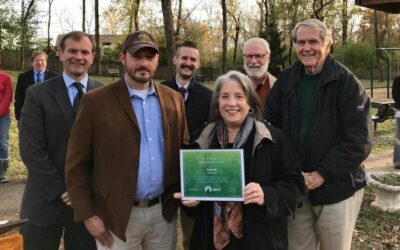Protecting wetlands
Wetland ecosystems provide significant benefits to fish, wildlife, and the economy. Approximately 60 percent of Tennessee’s wetlands have been destroyed due to historic mismanagement of these critical habitats. Tennessee Wildlife Federation works to restore wetland habitats statewide.
Why Wetlands?
of Tennessee’s wetlands have been destroyed.
Flood
Wetlands act as natural sponges that trap and slowly release flood waters.
of rare species use wetlands at some point in their life.

Wetlands provide critical habitat for numerous wildlife and plant species.
Bottomland hardwood forests are the most common type of wetlands in Tennessee and are abundant in the floodplains of streams and rivers.
Wetland ecosystems are often undervalued and underappreciated despite providing significant economic and ecological benefits. They help reduce damage from flooding, maintain water quality, replenish groundwater, store carbon, and provide important wildlife habitat. Wetlands also filter out sediment and chemicals from surface-water runoff.
Approximately one million acres of Tennessee’s wetlands have been destroyed due to historic land uses, impoundment, sedimentation, and urbanization. Restoring degraded wetlands and protecting existing wetlands—and the wildlife and plants that use them—is critical.
What we do for wetlands
1,200
of wetlands restored or conserved.
Wetlands restored by Tennessee Wildlife Federation are permanently protected with conservation easements.
5
of monitoring to measure success and long-term viability of restored wetlands.
Are you a landowner?
Interested in learning if your land is a fit for habitat restoration?
Give
Your generosity helps manage wildlife populations and restore habitats for a more vibrant Tennessee.
More Habitat Restoration
Tennesseans Create NWF Certified Wildlife Habitats
Tennessee Wildlife Federation board member Anker Browder presented Knoxville Mayor Rogero and city officials with NWF’s Community Wildlife Habitat certification. First Community Wildlife Habitat in...
Bipartisan Bill Aims to Keep Wildlife from Becoming Endangered
Recovering America’s Wildlife Act funds proactive, state-led efforts nationwide. Tennessee Wildlife Resources Agency would receive $20.8 million annually. According to the 2015 Tennessee State...
Habitat Restoration Projects Under Construction
Habitat conservation and restoration is a top priority for the Federation, and director of conservation Chris Roberts is excited to have multiple projects in the pipeline. By conserving lands and...



